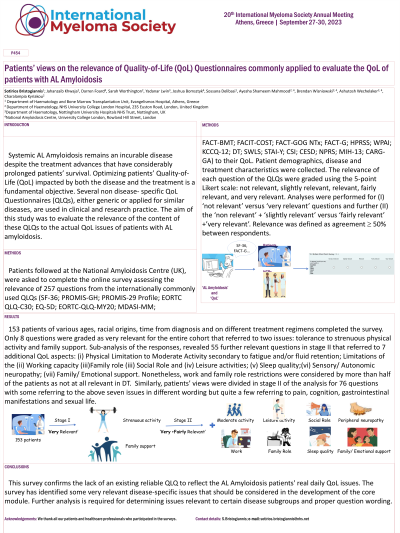QoL and Patient-Reported Outcome and Supportive Care
Poster Session 3
P-454: Patients views on the relevance of Quality of Life (QoL) Questionnaires commonly applied to evaluate the QoL of patients with AL Amyloidosis
Friday, September 29, 2023
1:15 PM - 2:15 PM EEST


Sotirios Bristogiannis
Haematology Registrar
Evangelismos General Hospital, Athens, Greece
Athens, Attiki, Greece
Introduction: Systemic AL Amyloidosis remains an incurable disease despite the treatment advances that have considerably prolonged patients’ survival. Optimizing patients’ QoL impacted by both the disease and the treatment is a fundamental objective. Several non disease- specific QoL Questionnaires (QLQs), either generic or applied for similar diseases, are used in clinical and research practice. The aim of this study was to evaluate the relevance of the content of these QLQs to the actual QoL issues of patients with AL amyloidosis.
Methods: Patients followed at the National Amyloidosis Centre (UK), were asked to complete the online survey assessing the relevance of 257 questions from the internationally commonly used QLQs (SF-36; PROMIS-GH; PROMIS-29 Profile; EORTC QLQ-C30; EQ-5D; EORTC-QLQ-MY20; MDASI-MM; FACT-BMT; FACIT-COST; FACT-GOG NTx; FACT-G; HPRSS; WPAI; KCCQ-12; DT; SWLS; STAI-Y; CSI; CESD; NPRS; MIH-13; CARG-GA) to their QoL. Patient demographics, disease and treatment characteristics were collected. The relevance of each question of the QLQs were graded using the 5-point Likert scale: not relevant, slightly relevant, relevant, fairly relevant, and very relevant. Analyses were performed for (I) ‘not relevant’ versus ‘very relevant’ questions and further (II) the ‘non relevant’ + ‘slightly relevant’ versus ‘fairly relevant’ +’very relevant’. Relevance was defined as agreement ≥ 50% between respondents.
Results: 153 patients of various ages, ethnicities, time from diagnosis and on different treatment regimens completed the survey. Only 8 questions were graded as very relevant for the entire cohort that referred to two issues: tolerance to strenuous physical activity and family support. Sub-analysis of the responses, revealed 55 further relevant questions in stage II that referred to 7 additional QoL aspects: (i) Physical Limitation to Moderate Activity secondary to fatigue and/or fluid retention; Limitations of the (ii) Working capacity (iii)Family role (iii) Social Role and (iv) Leisure activities; (v) Sleep quality;(vi) Sensory/ Autonomic neuropathy; (vii) Family/ Emotional support. Nonetheless, work and family role restrictions were considered by more than half of the patients as not at all relevant in DT. Similarly, patients’ views were divided in stage II of the analysis for 76 questions with some referring to the above seven issues in different wording but quite a few referring to pain, cognition, gastrointestinal manifestations and sexual life.
Conclusions: This survey confirms the lack of an existing reliable QLQ to reflect the AL Amyloidosis patients' real daily QoL issues. The survey has identified some very relevant disease-specific issues that should be considered in the development of the core module. Further analysis is required for determining issues relevant to certain disease subgroups and proper question wording.
Methods: Patients followed at the National Amyloidosis Centre (UK), were asked to complete the online survey assessing the relevance of 257 questions from the internationally commonly used QLQs (SF-36; PROMIS-GH; PROMIS-29 Profile; EORTC QLQ-C30; EQ-5D; EORTC-QLQ-MY20; MDASI-MM; FACT-BMT; FACIT-COST; FACT-GOG NTx; FACT-G; HPRSS; WPAI; KCCQ-12; DT; SWLS; STAI-Y; CSI; CESD; NPRS; MIH-13; CARG-GA) to their QoL. Patient demographics, disease and treatment characteristics were collected. The relevance of each question of the QLQs were graded using the 5-point Likert scale: not relevant, slightly relevant, relevant, fairly relevant, and very relevant. Analyses were performed for (I) ‘not relevant’ versus ‘very relevant’ questions and further (II) the ‘non relevant’ + ‘slightly relevant’ versus ‘fairly relevant’ +’very relevant’. Relevance was defined as agreement ≥ 50% between respondents.
Results: 153 patients of various ages, ethnicities, time from diagnosis and on different treatment regimens completed the survey. Only 8 questions were graded as very relevant for the entire cohort that referred to two issues: tolerance to strenuous physical activity and family support. Sub-analysis of the responses, revealed 55 further relevant questions in stage II that referred to 7 additional QoL aspects: (i) Physical Limitation to Moderate Activity secondary to fatigue and/or fluid retention; Limitations of the (ii) Working capacity (iii)Family role (iii) Social Role and (iv) Leisure activities; (v) Sleep quality;(vi) Sensory/ Autonomic neuropathy; (vii) Family/ Emotional support. Nonetheless, work and family role restrictions were considered by more than half of the patients as not at all relevant in DT. Similarly, patients’ views were divided in stage II of the analysis for 76 questions with some referring to the above seven issues in different wording but quite a few referring to pain, cognition, gastrointestinal manifestations and sexual life.
Conclusions: This survey confirms the lack of an existing reliable QLQ to reflect the AL Amyloidosis patients' real daily QoL issues. The survey has identified some very relevant disease-specific issues that should be considered in the development of the core module. Further analysis is required for determining issues relevant to certain disease subgroups and proper question wording.
